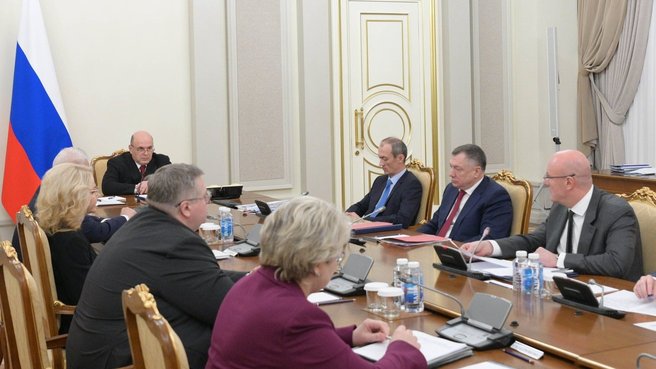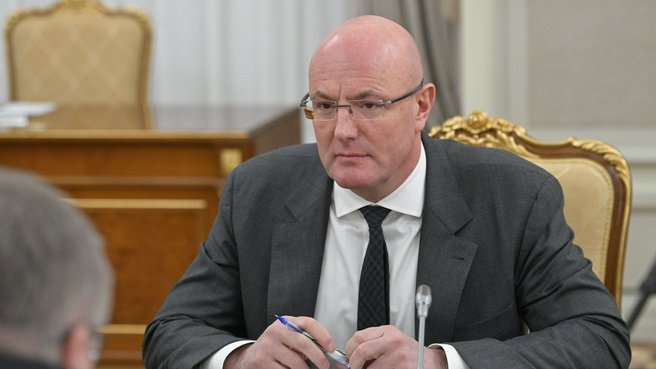Agenda: Expanding the list of medical foods for children with disabilities; a plan of measures to boost employment of people with disabilities; results of a competition among universities to establish advanced engineering schools
Mikhail Mishustin’s opening remarks
Mikhail Mishustin: Good afternoon, colleagues,
Let us begin by discussing the issue of helping children with grave and rare diseases. They need special care, treatment and diet, all of which they receive free of charge.
Every year, the Government expands the list of specialised food products for these children. It will include 111 items starting next year.
It is crucial that these children receive this nutrition regularly as prescribed by their doctors. They need it to feel better, to grow and develop. Therefore, it is necessary to strictly monitor its availability in sufficient amounts in all regions of the country.
Another important topic is the employment of people with disabilities.
In order for these individuals to acquire a profession and succeed in it, they need greater support. This requires comprehensive and consistent interaction among employment offices, social protection services, educational and public institutions, as well as regional authorities and employers.
The Government has introduced a number of amendments to its plan of measures to employ more people with disabilities. Some of these amendments are aimed at facilitating the hire of college and university graduates and introducing a regional standard for the promotion of social entrepreneurship.
Importantly, the plan provides for drafting measures to assist the employment of disabled individuals who participated in the special military operation. The President recently emphasised the need to support them in their efforts to acquire new skills or professions. It is essential to make sure that they are in demand, able to work and provide for their families.
The document also includes five targeted indicators for the quality and effectiveness of the planned measures.
This will help people with disabilities and health restrictions to work, earn a living, become more independent, and, most importantly, not face their problems alone.
Now let us turn to the important topic of higher education.
During my lecture at the Russian Knowledge (Znaniye) Society last week, I spoke in detail about an important project being implemented at the country’s leading universities, namely, the advanced engineering schools project. These schools’ goal is to train skilled personnel for the high-tech and knowledge-based sectors of the national economy in such priority areas as microelectronics, instrument-making, artificial intelligence, nuclear energy, and machine-building, to name a few.
To create a platform with laboratories, pilot plants, interactive complexes and modern equipment, higher educational institutions are invited to submit an application to take part in a competition sponsored by the Ministry of Science and Higher Education. The winners of the competition will receive grants. Currently, 30 schools of this kind are successfully operating in the country.
This project immediately proved its relevance. A second competition involving 73 universities was held last September.
Mr Chernyshenko, could you please tell us about its results in more detail.
Dmitry Chernyshenko: Mr Mishustin,
Forty-two socioeconomic development initiatives are being implemented as per your instructions; the Advanced Engineering Schools federal project is one of them.
As you said, 30 schools, which have proven effective, were selected last year. They have been created at engineering universities in 15 regions. The project covers seven federal districts.
These schools are educating top-quality engineers in 20 fields, including engine manufacturing, medical instrument engineering, nuclear engineering, aviation and rocket and space technology, artificial intelligence, and others.
As you mentioned, we need educated professionals to work on mega-projects. The purpose of advanced engineering schools is to train such personnel.
Over two years, 12.6 billion roubles from the federal budget has been allocated to support them. Approximately a third of this amount – 4.3 billion roubles – was taken from non-budgetary sources, which highlights our industrial partners’ interest in this project.
More than 150 leading high-tech companies are involved in the education process at these schools. They not only fund the advanced engineering school curricula, but are also widely involved in the training process by creating education modules. They want these school graduates to work at their companies.
This creates a whole new quality of engineering training.
This university-company synergy is used to develop solutions for the real sector of the economy.For example, until recently, Russia did not have a single mass-produced DNA sequencer. The Medical Engineering School has made this possible.
In connection with the start of the mega-projects and with the interest shown by the regions, our industrial partners and universities are expanding this programme; you have set a goal of selecting at least 10 additional advanced engineering schools.
The competition ended on Tuesday, and it was a tough race with over seven applicants per vacancy. All applicants were heard by an ad hoc board. Due to the high demand and the need for staffing mega-projects, the board decided to pick 20 winners, which is significantly more than initially planned.
As a result, starting next year, students in 13 more regions – the Vologda and Voronezh regions, Moscow, St Petersburg, Tatarstan, the Omsk, Samara, Sakhalin, Tula, Ulyanovsk, and Chelyabinsk regions, the Chechen Republic, and the Yaroslavl Region – will have access to advanced engineering training.
The advanced engineering schools will be supported by 16.5 billion roubles from the budget in 2024, including 4.3 billion roubles for new schools. Our industrial partners will match this amount to support new schools next year by providing 4.2 billion roubles, that is, they will match it almost rouble for rouble. By 2030, this amount will exceed 30 billion roubles.
Thus, the advanced engineering school system in Russia will include 50 universities in 23 regions.
It is important to note that the goals of all selected schools are in line with the National Security Strategy, the Strategy for Scientific and Technological Development, and other key planning documents, as well as the priorities of ensuring personnel and technological sovereignty set by the President.
Also, to promote the project, we plan to rotate advanced engineering schools similar to the mechanism that we use as part of the world-class scientific and training centre programme.
Mikhail Mishustin: Thank you, Mr Chernyshenko.
Please keep the implementation of this project under your personal control.
Educating highly skilled engineers is a priority. These university graduates must prove that engineering is a popular profession. After all, our country’s technological sovereignty is at stake.










